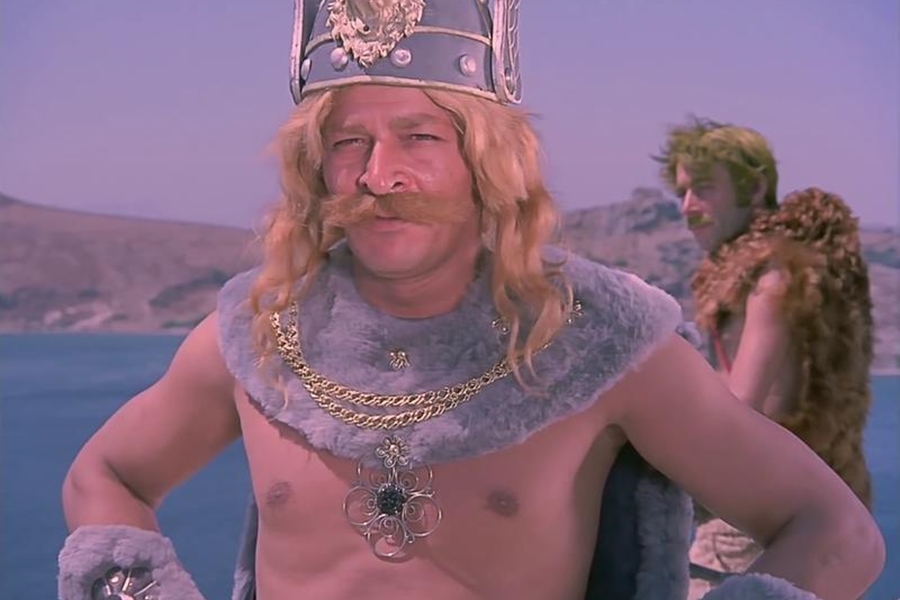Tarkan Versus the Vikings, Turkey’s answer to the Italian sword and sandal films, is more fun than the proverbial barrel of monkeys and just as crazed. Everything in this movie is energetic, outsized, colorful and wacky, from Tarkan’s mighty moustache to the Vikings’ red and blue fuzzy underoos. Tarkan doesn’t just walk around, like Hercules – he runs, he leaps, he literally bounces from place to place. The gigantic melees capture the frenetic flavor of old Errol Flynn movies, but up the ante of sex and violence to please ‘70s moviegoers. It’s like Conan the Barbarian done on $10,000 and amphetamines.
Tarkan is a fantastic bit of trash cinema from the now largely defunct Turkish film industry. During a brief, glorious period in the ’60s and ‘70s, Turkey pumped out a huge number of pulp masterpieces, perhaps the most famous of which is the excellent Kilink Istanbul’da. Turkish movies blended the sensibilities of comic books, serials, and violent ‘70s pulp entertainment, into a uniquely strong Turkish brew. While some may only be familiar with the rip-offs of Western pop culture like The Man Who Saved the World (Star Wars) or 3 Dev Adam (Turkish Captain America and El Santo vs Evil Turkish Spiderman), there was quite a bit of original film-making going on also.
Tarkan, appropriately enough, is an adaptation of a long-running and extremely popular local comic book series based on the adventures of the eponymous hero, which filled a similar niche to Robert E. Howard’s Conan novels. Written by Sezgin Burak, the series lasted many years and inspired an entire series of Tarkan films. Tarkan is a classic loner hero, raised by wolves, still closer to animals than to people, but willing to step in and save the day when injustice threatened. Kartal Tibet was the not the only man to play Tarkan, but he was far and away the most successful. His Tarkan is small but athletic and wiry, armed with knife and bow (the traditional weapon of the steppe Turk), and more comfortable with his father-and-son wolf companions (both named Kurt) than with people. Definitely the strong, silent type.
In the beginning of the film, Tarkan, champion of the Turkish peoples, has been tasked with escorting the Great Attila’s daughter, the feisty Princess Yonca. No sooner do they arrive at an undermanned Turkish fortress, when they are set upon by a horde of hairy, merciless Vikings, who slaughter the men and children, and kidnap all the women. The Viking Commander, Toro, is in the employ of the villainous Lotus, a daughter of the Chinese Emperor who wants Yonca for her own advantage (who knew that the Chinese and the Vikings were the original Axis of Evil?). Toro slays the older wolf, and Tarkan is left for dead with several arrows in his back. Fortunately, Kurt, Jr. witnessed his father’s murder (as illustrated by an awe-inspiring quadruple zoom shot), and as soon as the two have recovered, they set off to avenge Kurt, Sr., and incidentally to rescue the Princess.
Meanwhile, Toro and Lotus get up to all kinds of shenanigans, sleeping with and betraying each other, deposing the rightful Viking King, and trying to feed his pretty daughter Ursula to a giant rubber octopus that hangs around outside their castle. Eventually, Tarkan shows up, joins forces with Ursula, her gang of cute Viking girls, and a bizarre giant with a crush on Ursula, and kicks Toro’s butt.
Tarkan is a crowd-pleaser in the truest sense of the word. Rubber monsters, swashbuckling, sexy girls, manly men, evil one-eyed Vikings … everything you could want is here. The film’s creators were clearly influenced by the 1958 slash-and-burn opus, The Vikings, starring tough guy Kirk Douglas. Several of that movie’s greatest hits are put to good use again in Tarkan, including a falcon vs. eyeball showdown, and a charming game where women are strung up by their hair and used for axe-throwing practice. Highlights from Hollywood spectaculars are not the only things Tarkan borrows – among the recognizable musical cues are Also Sprach Zarathustra and Morricone’s harmonica theme from Sergio Leone’s Once Upon A Time In The West (if you’re going to steal, might as well do it from the best).
The film is a helter-skelter mix of the low-tech and the weird. The Vikings are a funny looking scrawny bunch in bright furry clothes, blues, yellows, reds, purples – think Braveheart as staged by The Muppets. The costumes are so outlandish, and the violence so extreme, that I was put in mind of Eisenstein’s Alexander Nevsky, with its imposing Teutonic knights. The Viking women are basically sorority girls with swords and helmets, and the inflatable octopus … don’t even get me started on the octopus (I loved the octopus). The actors also all sport some really tremendous hair.
The supporting cast is so colorful that Tarkan himself takes something of a back seat. Lotus wears silken robes, does a knife dance, undresses at the drop of a hat, and oozes malevolence. Toro stomps around in his matching powder-blue fuzzy diaper, wrist-warmers, and cape, looking like he was just rejected from an audition to join He-Man and the Masters of the Universe. Eva Bender plays Ursula as a tough sex-bomb in barely sealed vest and winged helmet. Even Tarkan’s wolves have tons of character. The two Kurts, played by what appear to be a couple of German Shepherds that have been overdubbed with wolf howls, are the best-trained dogs I’ve seen in a movie since Moti the Wonder Dog in Mard (who could whistle, drive a wagon, and construct Molotov cocktails). Kurt, Jr. adds a few new tricks, like crying and, in a scene that rivals any for sheer silliness, climbing a vertical wall.
Tarkan is simply dripping in national pride. After 50 odd years of humiliation following the collapse of the Ottoman Empire, and Turkey’s staggering losses during World War I, the national cinema provided a great vehicle for pride and patriotism, to some extent mirroring similar developments in Chinese cinema. Characters constantly refer to the strength and courage of the Turks, and even one of the Vikings (a legendarily hardy and warlike breed themselves) suggests that they ought to think twice before messing with the Turks.
Recommended? Absolutely. Be warned though, the four stars I give Tarkan are not based on technical merit, or excellent dialogue/performance etc. On any scale of normal quality, Tarkan is clearly total crap. The four stars are based entirely on the fact that it’s amazingly fun, and a perfect way to introduce yourself to the insanity that is Turkish cinema.



Tarkan is definitely not a copy. You should correct this.
There are many films of Tarkan. These films are based on the comics from Sezgin Burak.
Both- comics and films- are original Turkish productions.